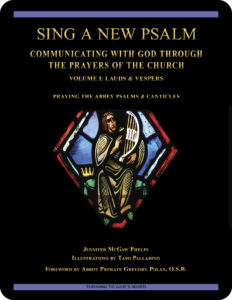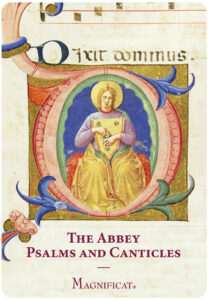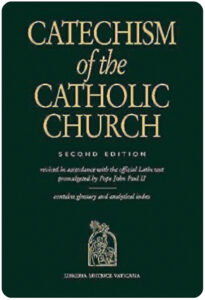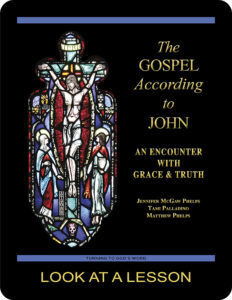 Sing a New Psalm:
Sing a New Psalm:
Communicating with God Through
the Prayers of the Church
Volume I: Lauds & Vespers
Lesson 6 A Soul Athirst for the Living God
Psalm 42, Psalm 43, and Psalm 30
Tuesday Lauds (Week I)
Revised Standard Version Catholic Edition (RSVCE)*
New American Bible Revised Edition (NABRE)*
Catechism of the Catholic Church
ex libris (in our library)
next lesson: One Thing I Ask of the LORD
This material coordinates with Lesson 6 on pages 26–29 in Sing a New Psalm: Communicating with God Through the Prayers of the Church—Volume I: Lauds & Vespers. Our Catholic Bible study is based on The Abbey Psalms and Canticles, an English translation of the Psalms prepared by the monks at Conception Abbey in 2010 and first published as The Revised Grail Psalms. The Abbey Psalms and Canticles is a revision of that work, finished in 2020 and published by the United States Conference of Catholic Bishops (USCCB). Wording and numbering of some Psalms and verses in other translations may differ. This new translation of the Psalms in the process of being added to all English-language Liturgy of the Hours books used in the United States. The USCCB also plans a liturgical Bible based on the NABRE translation.
The Abbey Psalms and Canticles, an English translation of the Psalms prepared by the monks at Conception Abbey in 2010 and first published as The Revised Grail Psalms. The Abbey Psalms and Canticles is a revision of that work, finished in 2020 and published by the United States Conference of Catholic Bishops (USCCB). Wording and numbering of some Psalms and verses in other translations may differ. This new translation of the Psalms in the process of being added to all English-language Liturgy of the Hours books used in the United States. The USCCB also plans a liturgical Bible based on the NABRE translation.
“Unlike other prayers in sacred Scripture, the prayers contained in the Psalms are not inserted into a narrative story that specifies their meaning and function. Instead, the Psalms are given to the believer precisely as a text of prayer. Since they are the Word of God, the believer who prays the Psalms speaks to God using the very words that God himself has given to us. Thus, in praying the Psalms we learn to pray. The Psalms are a school of prayer.”—Pope Benedict XVI
welcome to our in-depth study of the Psalms
We invite groups and individuals to check out the sample first lesson from this 28- lesson Turning to
lesson Turning to  God’s Word Catholic Bible study. Our online study pages include additional questions, commentary, and prayers based on the Psalm texts. Sing a New Psalm: Communicating with God Through the Prayers of the Church—Volume I: Lauds & Vespers has been granted an imprimatur. A digital version of this study can be purchased from our website shop. Volume II: Vigils, Day Prayer & Compline is scheduled for publication in 2025. If you have a Bible-study question or comment, click on one of the “ask us your question” or “what do you think” buttons on any online study page.
God’s Word Catholic Bible study. Our online study pages include additional questions, commentary, and prayers based on the Psalm texts. Sing a New Psalm: Communicating with God Through the Prayers of the Church—Volume I: Lauds & Vespers has been granted an imprimatur. A digital version of this study can be purchased from our website shop. Volume II: Vigils, Day Prayer & Compline is scheduled for publication in 2025. If you have a Bible-study question or comment, click on one of the “ask us your question” or “what do you think” buttons on any online study page.
open with prayer
It’s always wise to begin any Bible study with prayer, whether reading the Scriptures alone or meeting with others in a discussion study group. You can pray using your own words, pray one of the Psalms in this lesson, or use one of the opening prayers on our website. We especially like the following:
Lord Jesus, you promised to send your Holy Spirit
to teach us all things.
As we read and study your word today,
allow it to touch our hearts and change our lives. Amen.
Scripture holds opposing views of water in constant tension
 This illustration by Turning to God’s Word co-founder Tami Palladino depicts the positive aspects of water as something necessary for life. For this reason, people in the ancient world began using water in their purification rituals. In Psalm 42, the Psalmist describes his longing for God as a powerful thirst. In Christianity, the positive symbolism of water related to purification and life shows up in the sacrament of Baptism, which also relies on the negative symbolism associated with deadly waters of the Flood described in the seventh and eighth chapters in the book of Genesis. You can learn more about Noah and the Flood in Lesson 6 The Great Flood & God’s Covenant with Noah in the Turning to God’s Word Catholic Bible study In the Beginning: The Book of Genesis. How many ways can you think of in which water is used as powerful symbol of good in the Scriptures? Click on
This illustration by Turning to God’s Word co-founder Tami Palladino depicts the positive aspects of water as something necessary for life. For this reason, people in the ancient world began using water in their purification rituals. In Psalm 42, the Psalmist describes his longing for God as a powerful thirst. In Christianity, the positive symbolism of water related to purification and life shows up in the sacrament of Baptism, which also relies on the negative symbolism associated with deadly waters of the Flood described in the seventh and eighth chapters in the book of Genesis. You can learn more about Noah and the Flood in Lesson 6 The Great Flood & God’s Covenant with Noah in the Turning to God’s Word Catholic Bible study In the Beginning: The Book of Genesis. How many ways can you think of in which water is used as powerful symbol of good in the Scriptures? Click on  Tami’s illustration (right) to enlarge it. Her original illustration is on page 27 in Sing a New Psalm: Communicating with God Through the Prayers of the Church—Volume I: Lauds & Vespers.
Tami’s illustration (right) to enlarge it. Her original illustration is on page 27 in Sing a New Psalm: Communicating with God Through the Prayers of the Church—Volume I: Lauds & Vespers.
WHAT DO YOU THINK about the location of the Psalmist’s God?
The question repeated in Psalm 42 gives us insight into something that greatly concerns the Psalmist. He repeatedly is being asked: “Where is your God?”
 ? What does this suggest to you about the people who are asking the question?
? What does this suggest to you about the people who are asking the question?
? What does it tell you about the Psalmist?
? What question does the Psalmist ask God?
? What question does he ask himself?
? Have you ever been challenged to prove the existence of your God?
? Have you ever thought that God may have forgotten you?
? How does the Psalmist resolve these questions?
? How do you?
 baptism—you could look it up in our archives
baptism—you could look it up in our archives
Most biblical references to water point to the sacrament of Baptism. To learn about the relationship between Christian Baptism and ancient Jewish purification rituals, read Lost in Translation, an online column in which Turning to God’s Word author Matthew Phelps helps readers connect with ideas expressed in the original languages of the Scriptures. New Lost in Translation entries are posted on Mondays, and past entries are archived on our website. Contact us if you’d like to receive Lost in Translation by email every week.
 the popes inspire us—the Psalms are prayers that express hope
the popes inspire us—the Psalms are prayers that express hope
“Three Stars of Hope” on page 28 in Sing a New Psalm: Communicating with God Through the Prayers of the Church—Volume I: Lauds & Vespers is taken from a general audience with Pope St. John Paul II. The Holy Father looks at the three key phrases in Psalm 43, each displaying the Psalmist’s expectation that God will intervene to rescue him from the difficulties that plague his life. From what do you wish to be rescued? Consider whether you expect God’s help.
WHAT DO YOU THINK about spiritual expectations?
 ? What’s the main expectation underlying the Psalmist’s prayers in the Psalms associated with Tuesday Lauds (Week I)?
? What’s the main expectation underlying the Psalmist’s prayers in the Psalms associated with Tuesday Lauds (Week I)?
? Consider what these prayers would have meant to Jesus as he prayed them. What expectation do you think would have been foremost in Jesus’ mind and heart?
? What expectations do you bring to your prayers?
a translation difference: Sheol versus the grave
In The Abbey Psalms and Canticles translation of Psalm 30:4, the LORD has lifted the Psalmist’s soul from Sheol. Another valid way of translating that passage into English is found in The Revised Grail Psalms, in which the Psalmist praises the LORD for lifting his soul from the grave. To learn the distinction between Sheol, the Hebrew abode of the dead, and Christian ideas concerning death, read the vocabulary box “Pit” on page 29 in Sing a New Psalm: Communicating with God Through the Prayers of the Church—Volume I: Lauds & Vespers
ex libris—how would you define hope?
 Can you also offer definitions for the other two theological virtues (faith and love)? If these topics are of interest, you may like the book Faith Hope
Can you also offer definitions for the other two theological virtues (faith and love)? If these topics are of interest, you may like the book Faith Hope  Love by the philosophical writer Josef Pieper. His small volume consists of three sections in which he relies on etymology to examine linguistic clues that shed light on the underlying meaning of the theological virtues. The result is surprisingly helpful information that has many practical applications. Read excerpts and learn more about Faith Hope Love and other works related to Bible study at ex libris—main bookshelf.
Love by the philosophical writer Josef Pieper. His small volume consists of three sections in which he relies on etymology to examine linguistic clues that shed light on the underlying meaning of the theological virtues. The result is surprisingly helpful information that has many practical applications. Read excerpts and learn more about Faith Hope Love and other works related to Bible study at ex libris—main bookshelf.
t he best Catholic commentary about Scripture
he best Catholic commentary about Scripture
To find out more about how Church teaching is supported by passages in Sing a New Psalm: Communicating with God Through the Prayers of the Church—Volume I: Lauds & Vespers, check out the Index of Citations in the Catechism of the Catholic Church. Links (Revised Standard Version Catholic Edition [RSVCE*]) to the primary Scripture passages in the lesson and relevant paragraphs in the Catechism are provided here. Not every passage in the biblical text for this study is referenced in a Catechism paragraph, however, including Psalm 30 and Psalm 43 in this lesson.
Psalm 42:3—paragraph 2112
Psalm 42:8—paragraph 2803
don’t forget about our indexes & extra online material

 If you’re trying to locate information about a specific Scripture passage, you can look it up in the index at the back of the study book or sample lesson. If you want to find a particular commentary, you can look up its title in the topics index. To learn more about another book of the Bible for which there’s a Turning to God’s Word study, visit the online study directories to read the commentaries and watch any accompanying videos. Finally, if you have a question or would like to make a comment about any of our studies, you can use one of the “ask us your question” or “what do you think” buttons to email our authors.
If you’re trying to locate information about a specific Scripture passage, you can look it up in the index at the back of the study book or sample lesson. If you want to find a particular commentary, you can look up its title in the topics index. To learn more about another book of the Bible for which there’s a Turning to God’s Word study, visit the online study directories to read the commentaries and watch any accompanying videos. Finally, if you have a question or would like to make a comment about any of our studies, you can use one of the “ask us your question” or “what do you think” buttons to email our authors.
ex libris—Church documents & books about religious topics
Link to magisterial documents referred to in our Bible studies at ex libris—magisterial documents.  This listing includes significant recent encyclicals as well as a number of historical Church documents. Recommended books related to Scripture study can be found at ex libris—main bookshelf.
This listing includes significant recent encyclicals as well as a number of historical Church documents. Recommended books related to Scripture study can be found at ex libris—main bookshelf.
wondering how to pronounce some of these words?
The following links are to readings from the New International Version (NIV) Bible. To listen, open one of the links and click on the audio icon above the printed text. Although not taken from the translations used in our study materials, the NIV readings provide an audio guide to pronunciation of words in this lesson’s primary biblical texts. A close online version of the translation of the Bible used in Catholic liturgy in the United States as well as an audio guide for daily Mass readings for the current month can be found on the website of the United States Conference of Catholic Bishops (USCCB).
Psalm 42 (NIV)
Psalm 43 (NIV)
Psalm 30 (NIV)
 close with a Psalms-based prayer for Tuesday Lauds (Week I)
close with a Psalms-based prayer for Tuesday Lauds (Week I)
Many of our Catholic study groups like to conclude their discussions with a prayer based on the scriptural focus of their lesson. If you’re uncomfortable composing your own Bible-based prayers, you can follow our four easy steps. If you prefer, you can pray any of the Psalms in this lesson, or you can use the following short prayer.
O eternal and unchanging God,
you help us to persevere in our faith
in a secular culture that ignores your existence.
Come to the aid of all those who mourn
or who are plagued by depression.
We ask this through your Son, Jesus Christ,
whose rising from the dead brought
joy and salvation to those who love you. Amen.
Lesson 7 One Thing I Ask of the LORD, Tuesday Vespers (Week I)—Psalm 27 and Psalm 33
Lesson 5 Who May Abide in the LORD’s Tent? Monday Vespers (Week I)—Psalm 11, Psalm 15, Psalm 20, and Psalm 21
you also may like our study of the Gospel According to John
 The Gospel According to John: An Encounter with Grace & Truth, a 25-lesson Catholic Bible study with an imprimatur, examines the Fourth Gospel’s view of Jesus Christ as the Son of God, with special emphasis on the institution of the sacraments of the Church as the means by which Christians are purified and made holy. This recently revised study includes maps and additional commentary, and takes a closer look at the way in which Jesus relates to individual men and women. Click on the book’s cover to view a sample lesson.
The Gospel According to John: An Encounter with Grace & Truth, a 25-lesson Catholic Bible study with an imprimatur, examines the Fourth Gospel’s view of Jesus Christ as the Son of God, with special emphasis on the institution of the sacraments of the Church as the means by which Christians are purified and made holy. This recently revised study includes maps and additional commentary, and takes a closer look at the way in which Jesus relates to individual men and women. Click on the book’s cover to view a sample lesson.
start a Turning to God’s Word Bible study
Thank you for your interest in Sing a New Psalm: Communicating with God Through the Prayers of the Church—Volume I: Lauds & Vespers. 
 More information about beginning a Turning to God’s Word Bible study can be found on this website at start a Bible study, and Tami, Matthew, and I are available to answer questions or discuss concerns. Contact us to start this or one of our other studies or to have your schedule listed with other TtGW study groups on our website. —Jennifer
More information about beginning a Turning to God’s Word Bible study can be found on this website at start a Bible study, and Tami, Matthew, and I are available to answer questions or discuss concerns. Contact us to start this or one of our other studies or to have your schedule listed with other TtGW study groups on our website. —Jennifer
*There are seven deuterocanonical books in the Old Testament—the Books of Tobit, Judith, Wisdom, Sirach, Baruch, and First and Second Maccabees, as well as some passages in the Books of Esther and Daniel. Protestants usually refer to these works as “apocryphal,” a word that means “outside the (Protestant) canon” because they’re excluded from most Protestant Bibles. The word “deuterocanonical” means “second canon”; Catholics use that word to refer to any section of the Catholic Old Testament for which there are no extant, or existing, Hebrew manuscripts. All of the deuterocanonical books appear in the Septuagint, the earliest remaining versions of which date to the 1st century B.C. This Greek translation of the Old Testament was in common use by Jews at the time of Jesus—but the same books aren’t found in existing Hebrew manuscripts, which aren’t as old as the oldest version of the Septuagint. Learn more by reading How Do Catholic & Protestant Bibles Differ?
Turning to God’s Word printed Bible studies use the 2006 Revised Standard Version Second Catholic Edition (RSV2CE) translation for all Scripture references except the Psalms, which are taken from The Abbey Psalms and Canticles, prepared by the monks of Conception Abbey and published in 2020 by the United States Conference of Catholic Bishops (USCCB). All Scripture links for the online study pages for Sing a New Psalm: Communicating with God Through the Prayers of the Church—Volume I: Lauds & Vespers are to the 1966 Revised Standard Version Catholic Edition (RSVCE) translation. The New International Version (NIV) audio recordings follow the same chapter and verse numbering as the RSV Catholic translations, but the NIV doesn’t include the deuterocanonical passages.
The 1966 RSVCE uses archaic pronouns and verb forms such as “thee,” “thou,” “didst” in the Psalms and in direct quotations attributed to God. The 2006 RSV2CE replaces those with more accessible English. The few significant translation changes in the RSV2CE include rendering almah as “virgin” in the Book of Isaiah 7:14 and restoring the term “begotten” in the Gospel According to John 3:16.
The Psalms in this Bible study reflect numbering used in The Abbey Psalms and Canticles; Psalms numbering may vary in other translations. Numbering also may vary for a few other passages in this Bible study. Turning to God’s Word studies follow the numbering in the Revised Standard Version Catholic translations (RSVCE and RSV2CE). Discrepancies in the New American Bible Revised Edition (NABRE) are noted in the Index of Scripture Citations in the study book and the online sample.
 The companion to this Catholic Bible study from Turning to God’s Word, Sing a New Psalm: Communicating with God Through the Prayers of the Church—Volume II: Vigils, Day Prayer & Compline, will cover Psalms not included in Volume I: Lauds & Vespers. Volume II: Vigils, Day Prayer & Compline is scheduled for publication in 2025.
The companion to this Catholic Bible study from Turning to God’s Word, Sing a New Psalm: Communicating with God Through the Prayers of the Church—Volume II: Vigils, Day Prayer & Compline, will cover Psalms not included in Volume I: Lauds & Vespers. Volume II: Vigils, Day Prayer & Compline is scheduled for publication in 2025.
